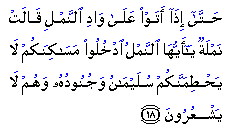Communication, Wealthy Heirs, Dejection
Issue 486 » July 18, 2008 - Rajab 14, 1429
Living The Quran
Al-Naml (The Ants)
Chapter 27: Verse 18
 Communication
Communication
Then, when they reached the valley of the ants, an ant said, 'Ants! Enter your dwellings so that Sulayman and his troops do not crush you unwittingly.'
The Quran supplies an interesting piece of information when talking about Prophet Sulayman's (peace be upon him) armies and mentions that there is an advanced "communications system" among the ants.
The scientific research made on ants in this century has shown that there is an incredible communications network among these creatures. In an article published in the National Geographic magazine, this point is explained:
Huge and tiny, an ant carries in her head multiple sensory organs to pick up chemical and visual signals vital to colonies that may contain a million or more workers, all of which are female. The brain contains half a million nerve cells; eyes are compound; antennae act as nose and fingertips. Projections below the mouth sense taste; hairs respond to touch.
Even if we do not notice it, the ants have quite a different method of communication in virtue of their sensitive sensing organs. They employ these sense organs at every moment of their lives, from finding their prey to following each other, from building their nests to fighting. They have a communication system which astonishes us, as human beings with intellect, with their 500,000 nerve cells squeezed into their bodies of 2 or 3 millimetres. What we should keep in mind here is that the half a million nerve cells and the complex communication system mentioned above belongs to an ant which in bulk is almost one millionth of a human being.
The ants, who constitute an orderly social structure with these various responses, lead a life based on mutual news exchange and they have no difficulty in achieving this correspondence. We could say that ants, with their impressive communication system, are hundred percent successful on subjects that human beings sometimes cannot resolve nor agree upon by talking (e.g. meeting, sharing, cleaning, defence, etc.)
Source:
"The Miracle in The Ant" - Harun Yahya, Chapter 2
Understanding The Prophet's Life
Leaving Heirs Wealthy
Sad ibn Abi Waqqas, who wanted to make out a will giving away in charity everything that he owned went to the Prophet (peace be upon him) and said to him: "O Messenger of Allah! I have a lot of wealth and only my daughter to inherit it from me. Should I bequeath all of my wealth in charity?"
The Prophet (peace be upon him) told him that he should not do so. Then Sad suggested bequeathing two-thirds of his wealth to charity. When the prophet again refused, Sad then suggested half of his wealth.
At this point the Prophet (peace be upon him) replied: "One-third, and that is still too much. It is better for you to leave your heirs wealthy, rather than leaving them dependent and begging from others.”
Source:
Sunan al-Tirmidhi (2042), Sunan Abu Dawud (2480), Sunan al-Nasai (3567) and Sunan Ibn Majah (2699)
Blindspot!
Dejection
Dejection is a state of sad thought, depression and a feeling of being worthless. This could be a result of anger with self or someone else, unexpressed anger, failure and frustration. Dejection is a deadly disease which can harm the body acutely or on a chronic basis and can irreversibly destroy one's relationships. It is during this state of dejection that people have suicidal thoughts and sometimes actions. During anger a person tries to manifest his verbal and physical strength. However, while in dejection, he completely gives up, thinking he is worthless.
Dejection can be the result of losses, financial or of a dear one, or even failure in work, education and business. Many times terminally ill patients, without any hope of getting better, would also be dejected. Sometimes dejection or depression is due to a chemical imbalance just like anger, whether it is a psychotropic condition with depletion of brain amines, epinephrine, norepinephrine and dopamine, or hormonal imbalance like hypothyroidism and Addison's disease. Therefore, in all cases of depression, when a physician sees them, he does and he must evaluate them for a treatable organic cause.
The way to fight dejection is a mind-control phenomenon. We must realize that we are not in control of our destiny. Certain failures and adversity have been designed to teach us certain lessons. We must know that someone else is in control of our past, present and future. Caliph Ali once said, "What makes me a believer in God is the fact that I realize that after doing everything humanly possible to make certain things go right, it goes wrong unexpectedly, making me believe that someone else was in control of that situation, not me."
The remedy for dejection is hope. God made hopelessness unlawful by saying, "Do not despair of God's mercy." Thus, no matter at what level of despair, depression and frustration we are, whether loss of a loved one or a job, or as the result of anger from someone else, we must not give up hope as there is a ray of hope at the end of the tunnel. The greatest hope is mercy from God.
During dejection, there is darkness, but in hope, there is light. Therefore, one must pray for this light to illuminate the heart so that we can see beyond what is causing the suffering today.
Source:
"Anger and Dejection - An Islamic Perspective" - Shahid Athar